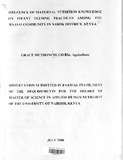| dc.description.abstract | Little is documented about the relationship between maternal nutrition knowledge and
infant feeding practices in the Maasai community. A cross sectional survey which
employed both descriptive and analytical methods of data collection and presentation was
designed to assess the influence of maternal nutrition on the infant (0 - 12 months)
feeding practices in the community. A previously pretested structured questionnaire was
used to interview a sample of 165 mothers with infants aged 0-12months and attending
Maternal and Child Health Clinic (MCH) at Ololunga sub-District Hospital. The study
also interviewed three Health Care Workers at the MCH clinic and five Traditional Birth
Attendants (TBAs). Data was collected on social demography of the households,
sanitation and hygiene, maternal nutrition knowledge, infant feeding practices, and the
anthropometry and morbidity of the index child.
Results showed that up to 86.7% of the infants studied had been delivered at home.
Prelacteal feeding was practiced by 71.5% of mothers. Expression of breast milk was not
common in the community and 99.4% of the mothers indicated unwillingness to express.
The traditional infant feeding practices played a major role in influencing infant feeding
practices. Up to 81.2% indicated having received traditional knowledge from their
relatives.
The main source of modern nutrition knowledge was indicated as the relatives (40.7%),
followed by the mass media (39.8%) and Traditional Birth Attendants. MCH clinic was
indicated as a source of knowledge by only 5.9% of the mothers. About 71% of mothers
indicated having received instructions on the modern infant feeding practices but 53%
demonstrated correct knowledge on the recommended period of exclusive breastfeeding
while only 1.2% of the mothers practiced exclusive breastfeeding as recommended by the
World Health Organizations. Traditionally, exclusive breastfeeding was not practiced.
Only 41.2% of mothers demonstrated correct knowledge on the recommended
breastfeeding frequency, but 78.2% were breastfeeding the infants on demand. About
76% of the mothers demonstrated correct knowledge on the recommended time to initiate
breastfeeding and about 73% were practicing. With regard to time of initiation of
breastfeeding and breastfeeding frequency, modern knowledge was similar to traditional
knowledge.
Sixty-three percent of mothers demonstrated correct knowledge on the recommended age
of introducing complementary foods, but 98.8% of the mothers had introduced
complementary foods before the age of one month similar to what is advocated by the
traditional knowledge. About 93% of the mothers demonstrated correct knowledge on the
frequency of feeding the complementary foods and about 94% were practicing. Bottlefeeding
of liquid foods was common (86%), while 13% of mothers used cups.
Cough/common cold and diarrhoea were the most prevalent diseases among the children
at 75% and 22% respectively. Diarrhoea was more prevalent among infants 0 - 6 months
than among the older infants (6 - 12 months). The nutritional status of the infants (0 - 6
months) was normal, with 96% having normal weight. High growth faltering was
observed with the older infants.
Poor hygiene and sanitation was evident in the study area with only about 27% of the
homesteads having pit latrine and 73% using bushes for human waste disposal. About
98% of the households lived in temporary houses with inadequate ventilation. Only about
20% had access to clean drinking water but about 57% treated their drinking water.
The results showed that when modern knowledge conflicted with the traditional
knowledge, practice of modern knowledge was low. However, practice was high when
modern knowledge acknowledged the traditional. This would imply that the mothers
were still adhering to the traditional knowledge to make choices on infant feeding
practices. The nutritional status of the infants (0 - 6 months) was normal and morbidity
especially diarrhea disease not excessive. It does not seem therefore justified to
recommend wholesale replacement of the traditional infant feeding practices with the
modern practices.
A multifaceted approach which takes into consideration factors such as maternal
nutrition, social econorrucs status of households, traditional knowledge, maternal
nutrition knowledge, beliefs and taboos is required in order to effectively improve infant
feeding practices. | en |

